Deep-sea science recently lost one its brightest beacons. Karen Von Damm was only 53 when she passed away on August 15th after a battle with liver cancer. It is a sad and tremendous loss for the hydrothermal vent research community. Karen was a professor of marine geochemistry at the University of New Hampshire. Rachel Haymon already wrote a brief summary about Karen’s professional background and her many world-renowned accomplishments, of which I encourage you to read. Today, Rachel and Captain Gary Chiljean of the R/V Atlantis held a memorial service prior to Alvin Dive 4464 and spread her ashes in the Pacific ocean. A small glass sphere containing some of her ashes was sent down with Alvin to rest at ‘P-Vent’ on the East Pacific Rise by expedition leader Bruce Strickrott. P-Vent is located at the 9°N Integrated Study Site where dedicated much of her professional life. The following montage was created from her memorial service.
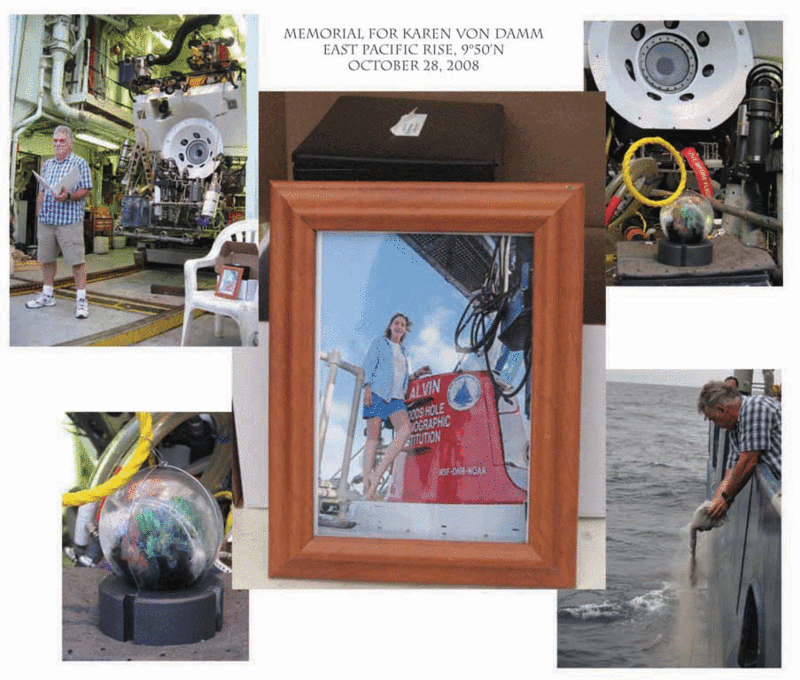
Karen was influential in my upbringing as a deep-sea biologist. During my last year in college I had the opportunity to accompany two geologists I had taken classes from on an expedition to the East Pacific Rise. Karen was a part the expedition and continuing her studies of temporal change in water chemistry from the hydrothermal vents we visited. I worked mostly with the biologists on board and assisted the geologists at night with towed camera operations. Needless to say the whole experience was amazing for me and I was hooked on deep-sea science!
I owe it to Karen for my first, and only, dive in the Alvin submersible. She sat me down in the mess late one night and looking at me very excitedly asked if I would like to dive with her the following morning. It was intended to be a short dive, it was BBQ cookout night after all so the sub pilot wanted to get back up in a hurry to shower and relax on the deck. Of course I was ecstatic and without a hesitation said YES! Its not uncommon for an undergraduate to have such a priviledge, but I was aware of how low I ranked on the totem pole (my official title on the expedition was "ship’s bitch", being one of two undergrads in the science party).
The whole experience was amazing. We made observations, did some filming, collected water samples at several vents and recovered some artificial tubeworm substrate experiments for another researcher (published here). Karen was very calm and reassuring and made sure I didn’t miss
anything. She even made the pilot let me drop the weights for our ascent! Karen never took anything for granted though she had dove on the site for over a decade. I took notes for her, noting the color combinations on the handles of the water samplers, while she reminded me to peer out of the 3 inch portals and admire the black smokers a meter in front of me. One of which was underneath my portal at one time! We did have to wrestle in the sub though. Karen is very tall and lean and the sub is very small with 3 people cramped inside. She took the following picture of me in the sub (on the left). You can see her knee in the lower left corner. The picture on the right taken of her in the computer lab on board the R/V Atlantis for the 2003 expedition.

I always appreciated how much she cared about students. She was so full of energy and loved to talk about science, in particular how important chemistry was for the vent inhabitants. She really saw the connections between tectonics, hydrothermal chemistry, biology and ecology. While I went on to be more biologically orientated, one cannot escape the grasp of geochemistry when you are working in chemosynthetic ecosystems. Her work was important well outside the bounds of the hydrothermal vent community, including contributions to improving our understanding of the global ocean budget as well as the chemistry behind the potential for life’s origins at reducing environments such as hydrothermal vents. We’ll miss you Karen. Keep diving. – Kevin Zelnio



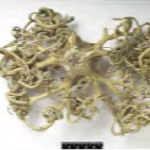
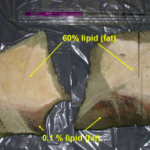
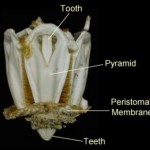
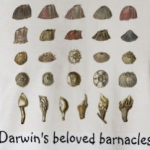
Wow.
Very touching Kevin. She sounds like a truly inspirational person, the type that makes a difference in a young scientists life.